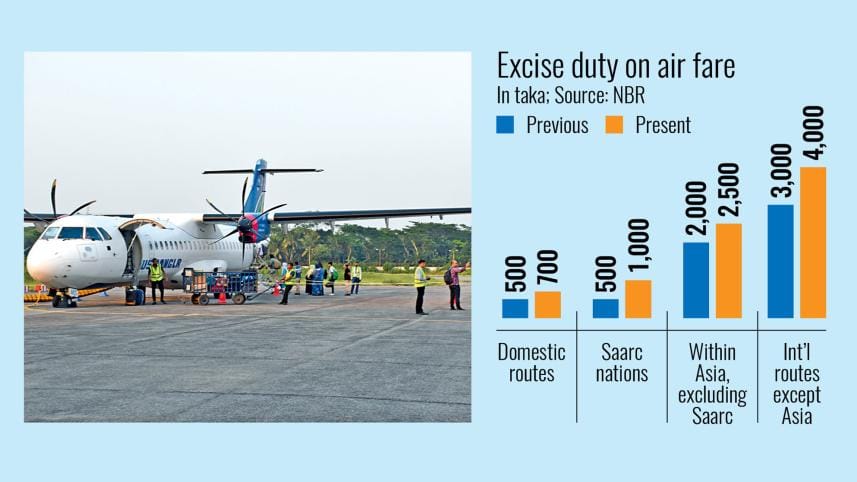Local airlines worried over excise duty hike

The government's recent decision to increase excise duty on domestic and international air tickets will have a serious negative impact on the aviation market, especially domestic passenger growth, said top officials of the country's air operators.
Apprehensions are now arising over the survival of airlines, as increases in fees or duties ultimately have a significant impact on the affordability of air tickets, they said.
On Thursday night, the National Board of Revenue (NBR) increased the excise duty on each domestic flight ticket from Tk 500 to Tk 700.
The excise duty on flight tickets to member countries of the South Asian Association for Regional Cooperation (SAARC) was raised from Tk 500 to Tk 1,000.
For trips outside SAARC countries but within Asia, the duty has been increased from Tk 2,000 to Tk 2,500.
The excise duty on tickets to Europe and America was raised from Tk 3,000 to Tk 4,000.
A senior official of the NBR stated that the government expects to collect an additional Tk 1,000 crore in revenue from the duty hike.
"Whenever taxes are increased, we have to incorporate them into our costs," Novoair Managing Director Mofizur Rahman told The Daily Star.
"Our experience shows that demand decreases by around 25 percent whenever airfares increase by Tk 500 to Tk 1,000," he said.
Rahman emphasised that increases in fees or duties have a significant impact on the affordability of flight tickets.
The Novoair MD further explained that the indirect loss to the government is greater than the additional revenue collected through higher taxes or duties.
"For example, if 300,000 passengers travel in a month, a 25 percent drop due to the duty hike means 75,000 fewer passengers, which is exactly what we are seeing now," said Rahman.
"The government could have collected more revenue at the current duty rates, because passenger numbers are declining due to the hike," he added.
"Our tax authorities are not considering this matter," he lamented.
"I believe that the government's aim of increasing the tax base by hiking duties will backfire. The government's revenue will decrease instead of increasing," he added.
Passengers were already paying various types of taxes and fees, including Tk 500 in excise duty, Tk 200 in travel tax, Tk 100 in airport development fees, and Tk 70 in passenger security fees.
All these total Tk 925 for domestic routes.
The latest excise duty hike has raised this amount to Tk 1,125.
Mofizur also pointed out that the government already takes 30 percent of airfares as direct tax and another 18 percent as indirect tax.
In other words, the government claims 48 percent of the money paid as airfare, which puts significant pressure on the pockets of consumers.
"We usually prepare for tax or duty increases during the national budget," said Kamrul Islam, general manager (public relations) of US-Bangla Airlines.
"However, the government's sudden decision to impose additional duties on domestic and international travel came as a bolt from the blue," he said.
He added that the government's decision would negatively impact passenger growth. "The government should have thought this through before implementing such measures," he said.
Kamrul also suggested that the government provide subsidies to airlines or reduce other surcharges to increase passenger numbers, which would, in turn, boost the aviation sector's contribution to the GDP, currently at 3 percent.
"The government's step will now adversely impact GDP growth, particularly in the aviation tourism industry," he said.
Air Astra CEO Imran Asif expressed strong disapproval of a finance adviser's comment that people who travel by domestic flights can afford an additional Tk 200 and that the hikes were marginal changes.
"First of all, the hike from Tk 500 to Tk 700 represents a 40 percent rise! If he thinks this is marginal, he needs a crash course in vocabulary," he said.
Asif pointed out that Bangladeshi air operators were struggling to cover costs due to competition from foreign airlines.
This is an industry where "the majority of travellers (who are migrant workers) don't even choose their airline (because intermediaries like manpower agents decide for them)," he said.
"… and where foreign airlines have a massive cost advantage, this abrupt tax hike will dig a deeper grave for Bangladeshi airlines operating or planning to operate international routes," he added.
"This is not rocket science but simple common sense," he remarked.
When asked about the matter, Biman Bangladesh Airlines General Manager (Public Relations) Bushra Islam declined to comment.




 For all latest news, follow The Daily Star's Google News channel.
For all latest news, follow The Daily Star's Google News channel. 

Comments